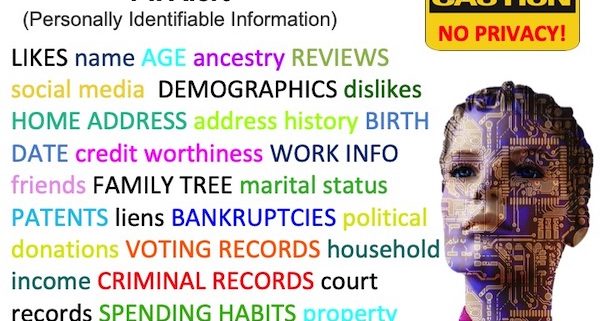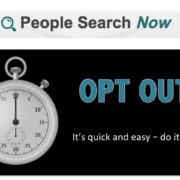Why is my personal information online?
Personal information is online because it stems from public records and is valuable to marketers and to data brokers who buy and sell it to those who are willing to pay for it. This data is also made available by government agencies and even though it is frustrating to see our personal data online, it is legal for it to be there. That said, citizens of the EU were provided with legal privacy rights in May 2018, Nevada privacy legislation went into effect in October of 2019 and comprehensive privacy legislation went into effect for California residents in January 2020. Many other states have privacy legislation in the works but in the meantime, there is no good reason for your personal data to be so easily accessible!
What personal information is available for free or for a small fee?
 Current and former addresses, phone numbers, email addresses.
Current and former addresses, phone numbers, email addresses.- Birth, marriage, divorce and death records.
- Real estate records including purchase and sale prices and neighbor info.
- Business entity filings, corporate affiliations, Business associates.
- Court records, Lien filings, foreclosures, UCC filings (forms filed by creditor to give notice of interest in debtor’s personal property).
- Family member names and their related information.
- Criminal records, mugshots.
- Government licenses, Professional licenses, hunting/fishing permits, weapons permits.
- Voter registration.
- Social media … and more.
To know what information you have online, see: How to locate your own online information.
Why do people care about personal data being online?
Public availability of personal information can lead to embarrassment and an inability to find rental housing or employment. Although illegal, public display of age and birthdates facilitates age discrimination and also aids identity theft. Location availability can lead to a variety of dangers. Online financial information is very detailed and many don’t want others to know about their financial status including the value of the assets they own.
Prohibited uses for background checks:
- Pre-employment, promotions, demotions or employee terminations, screening of gardeners, babysitters, nannies etc.
- Tenant worthiness for residential or commercial rentals or leases
- Eligibility for grants, financial aid, scholarships or acceptance to educational institutions.
- Screening of people who offer professional services (personal trainers, doctors, tutors, teachers, coaches, etc.)
- Insurance eligibility or credit decisions.
- Stalking or other criminal activities.
Although listed as prohibited uses, I see this list as a handy menu of the diverse ways in which background checks can and will be used. Don’t you?
Appropriate use:
- Obtain neighbor information.
- Protect family against registered neighborhood sex offenders.
- Get information on parents of children your kids will be spending time with.
- See driving record before letting someone drive you or your kids.
- Find out if new friends are trustworthy.
- Track down old friends, former classmates, estranged family.
- Research potential dates and study buddies before meeting.
- Get the scoop for online buyers and sellers, social media friends and followers.
- Get the scoop on celebrities.
- Know what’s on your background report.
What is the solution?
Remove as much personal online information as possible for general privacy purposes and to reduce the chance of identity theft or other harm. But, I don’t want to mislead about the ease of accomplishing this. There are many directory sites and some are unethical. Success requires a significant amount of time and follow up to achieve complete removal.
To clean up your online personal information, you can remove your information yourself or you can hire someone to do it for you. Since most directory sites do not want people to remove themselves they have a system in place that prevents mass removals and often requires multi-step verification. For this reason, complete removal takes time and follow up and most services that offer removals will not work well enough to give you enough privacy to warrant the effort.
- To begin removals yourself for a few major sites, click on this link for a list of step-by-step tutorials.
 If you hire a business to do removals for you.
If you hire a business to do removals for you.
- Check Better Business Bureau and online reviews.
- Confirm the number of sites they will remove you from.
- Know what is excluded.
- Understand warranties.
Most importantly, if you hire a company to do your removals, don’t take their word that your removals have been successful. YOU MUST VERIFY YOUR ONLINE ABSENCE AT COMPLETION!
It is important to understand that removing personal information from sites makes it harder to locate but the information is still available in the public records that are the source of the information such as those in a County Clerk Recorder’s Office. Although inconvenient, if someone doesn’t find the information they want on data broker sites, they can still obtain it from the original public records, unless those records have been sealed by a judge.
If you are trying to remove your personal data for safety reasons it’s important that you look yourself up regularly because your information is likely to surface on a few new sites. That said, if you stay on top of this, keeping personal information off the internet is manageable. For a removal quote from a growing number of directories you may contact me. If you use my free tutorials and need additional (free) help, simply leave comment on that tutorial and I’ll step in to help asap.
Until next time, … Stay Cyber Safe.






Leave a Reply
Want to join the discussion?Feel free to contribute!